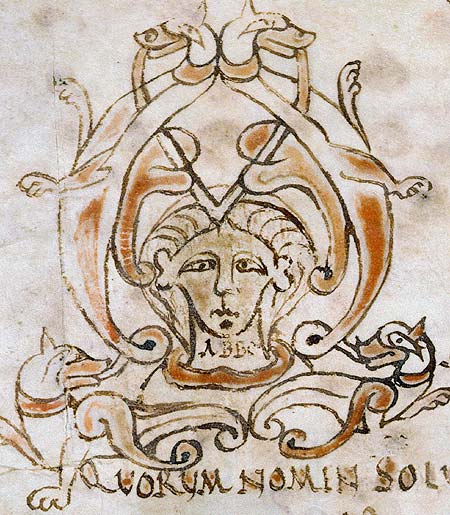- Abbo of Fleury
Infobox Saint
name=Saint Abbo of Fleury
birth_date=c. 945
death_date=death date|1004|11|13|df=y
feast_day=13 November
venerated_in=Roman Catholicism 
imagesize=250px
caption=Title page of one of Abbo of Fleury's tracts showing the word "ABBO". Created between 962 and 986 AD inSaint-Benoît-sur-Loire abbey.
birth_place=Orléans
death_place=The monastery ofLa Reole inGascony
titles=
beatified_date=
beatified_place=
beatified_by=
canonized_date=
canonized_place=
canonized_by=
attributes=
patronage=
major_shrine=
suppressed_date=
issues=
prayer=
prayer_attrib=Abbo of Fleury (in
Latin Abbo Floriacensis), also known as Abbon or Saint Abbo' (c. 945–13 November 1004) was a monk, and later abbot, of theBenedictine monastery ofFleury sur Loire (the modernSaint-Benoit-sur-Loire ) nearOrléans ,France .He was born near
Orléans and was educated atParis andReims , devoting himself to philosophy, mathematics, and astronomy. He spent two years inEngland assistingArchbishop Oswald ofYork in restoring the monastic system. He was also abbot and director of the school of the newly founded monastery ofRamsey in theCounty of Huntingdon from 986 to 987. When in England he learned of the martyrdom of Saint Edmund (November 870), and wrote a passion in Latin on it. He also wrote a Latin grammar for his students in England. Among his other works are a simplification of the "computus ", the computation of the date ofEaster ; an "Epitome de vitis Romanorum pontificum" (book on the lives of Romanpope s); and other treatises on controversial topics and letters. Around 980 to 985, he wrote a commentary on the "Calculus" ofVictorius of Aquitaine , before the introduction of Arabic numerals, when calculations were often quite complex. The wide range of Abbo's thought is reflected in the commentary, covering the nature of wisdom, the philosophy of number, the relationship of unity and plurality, and the arithmetic of the Calculus. Abbo drew on his knowledge of grammar, logic and cosmology to illustrate his arguments, and set it all in the broader context of his theology of Creation.Abbo returned to Fleury in 988, where he was selected abbot of Fleury after the death of the
Abbot Oilbold . But another monk, who had secured the support of the King and his sonRobert, Bishop of Orléans , contested the choice, and the matter assumed national importance. It was finally settled in favour of Abbo by the famousGerbert of Aurillac (laterPope Sylvester II ). The new abbot was active in contemporary politics: He was present at the Synod of St. Basolus (St. Basle), near Reims, at whichArnulf, Archbishop of Reims was tried for treason and deposed, to make way for Gerbert. In 996 King Robert II (Robert the Pious) sent him toRome to ward off a threatened papal interdict over Robert's marriage to Bertha. On the way to Rome he metPope Gregory V , who was a fugitive from the city from which theAntipope John XVI had expelled him. Between the Pontiff and the Abbot the greatest esteem and affection existed. The royal petition for a dispensation was rejected. Abbo succeeded in bringing about the restoration of Arnulf to thesee of Reims . He was influential in calming the excitement and fear about the end of the world which was widespread in Europe in 1000.In 1004 he attempted to restore discipline in the monastery of
La Reole , inGascony , by transferring some of the monks of Fleury into that community. But the trouble increased; fighting began between the two parties and when St. Abbo endeavoured to separate them he was pierced in the side by alance . He concealed the wound and reached his cell, where he died in the arms of his faithful discipleAimoin , who has left an account of his labours and virtues. The miracles wrought at his tomb soon caused him to be regarded in the Church ofGaul as asaint andmartyr , although he does not seem to have been officially canonized byRome . His feast is kept on 13 November.His
biography , written by his discipleAimoin of Fleury, in which much of Abbo's correspondence was reproduced, is of great importance as a historical source of information for the reign ofRobert II of France , especially with reference to thePapacy .External links and references
*Catholic
* A more extensive biography: http://www.wmich.edu/medieval/rawl/edmund/abbo.html
* His Passion of St.Edmund:
**http://www.wmich.edu/medieval/rawl/edmund/latin.html
**English translation: http://www.wmich.edu/medieval/rawl/edmund/lattrans.html
*An image of one of his manuscripts: http://www.irht.cnrs.fr/coloque_abbon_image.htm
* Alison Peden, "Unity, Order, and Ottonian Kingship in the Thought of Abbo of Fleury," in "Belief and Culture in the Middle Ages: Studies Presented to Henry Mayr-Harting". Eds. Henry Mayr-Harting, Henrietta Leyser and Richard Gameson (Oxford, OUP, 2001), pp.
Wikimedia Foundation. 2010.
